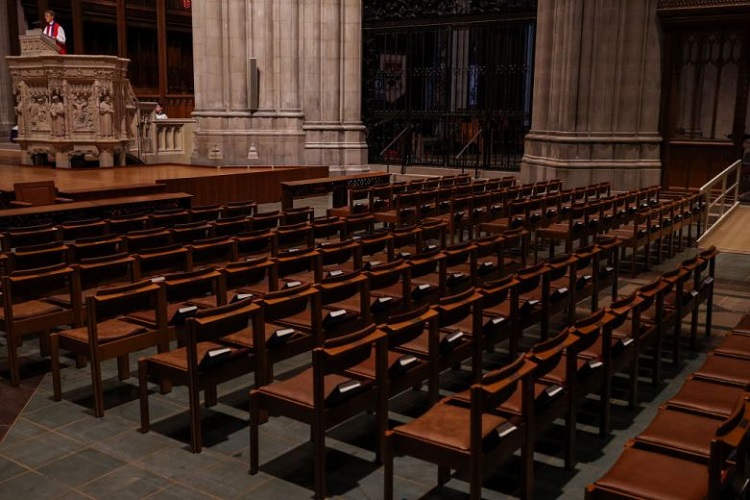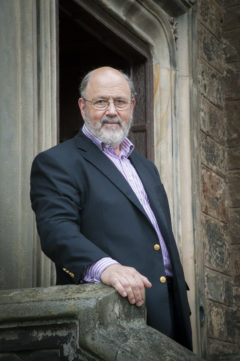Christianity and the coronavirus
Professor N.T. Wright from the School of Divinity writes about Christianity and the coronavirus pandemic for Time magazine.
N.T. Wright is a Professor of New Testament and Early Christianity at the University of St Andrews, a Senior Research Fellow at Oxford University’s Wycliffe Hall, and the author of more than 80 books. His research focusses on the New Testament and early Christianity, especially Paul and his letters and Jesus and the Gospels in their first-century Jewish and Graeco-Roman contexts.
This article originally appeared in Time magazine, 29 March 2020.

Christianity offers no answers about the coronavirus, it’s not supposed to
For many Christians, the coronavirus-induced limitations on life have arrived at the same time as Lent, the traditional season of doing without. But the sharp new regulations—no theater, schools shutting, virtual house arrest for us over-70s—make a mockery of our little Lenten disciplines. Doing without whiskey, or chocolate, is child’s play compared with not seeing friends or grandchildren, or going to the pub, the library or church.
There is a reason we normally try to meet in the flesh. There is a reason solitary confinement is such a severe punishment. And this Lent has no fixed Easter to look forward to. We can’t tick off the days. This is a stillness, not of rest, but of poised, anxious sorrow.
No doubt the usual silly suspects will tell us why God is doing this to us. A punishment? A warning? A sign? These are knee-jerk would-be Christian reactions in a culture which, generations back, embraced rationalism: everything must have an explanation. But supposing it doesn’t? Supposing real human wisdom doesn’t mean being able to string together some dodgy speculations and say: “So that’s all right then?” What if, after all, there are moments such as T. S. Eliot recognized in the early 1940s, when the only advice is to wait without hope, because we’d be hoping for the wrong thing?

Rationalists (including Christian rationalists) want explanations; Romantics (including Christian romantics) want to be given a sigh of relief. But perhaps what we need more than either is to recover the biblical tradition of lament. Lament is what happens when people ask “Why?” and don’t get an answer. It’s where we get to when we move beyond our self-centered worry about our sins and failings and look more broadly at the suffering of the world. It’s bad enough facing a pandemic in New York City or London. What about a crowded refugee camp on a Greek island? What about Gaza? Or South Sudan?
At this point the Psalms, the Bible’s own hymnbook, come back into their own, just when some churches seem to have given them up. “Be gracious to me, Lord,” prays the sixth Psalm, “for I am languishing; O Lord, heal me, for my bones are shaking with terror.”
“Why do you stand far off, O Lord?” asks the 10th Psalm plaintively. “Why do you hide yourself in time of trouble?” And so it goes on: “How long, O Lord? Will you forget me for ever?” (Psalm 13). And, all the more terrifying because Jesus himself quoted it in his agony on the cross: “My God, my God, why have you forsaken me?” (Psalm 22).
Yes, these poems often come out into the light by the end, with a fresh sense of God’s presence and hope, not to explain the trouble but to provide reassurance within it. But sometimes they go the other way. Psalm 89 starts off by celebrating God’s goodness and promises, and then suddenly switches and declares that it’s all gone horribly wrong. And Psalm 88 starts in misery and ends in darkness: “You have caused friend and neighbor to shun me; my companions are in darkness.” A word for our self-isolated times.
The point of lament, woven thus into the fabric of the biblical tradition, is not just that it’s an outlet for our frustration, sorrow, loneliness and sheer inability to understand what is happening or why. The mystery of the biblical story is that God also laments. Some Christians like to think of God as above all that, knowing everything, in charge of everything, calm and unaffected by the troubles in his world. That’s not the picture we get in the Bible.
God was grieved to his heart, Genesis declares, over the violent wickedness of his human creatures. He was devastated when his own bride, the people of Israel, turned away from him. And when God came back to his people in person—the story of Jesus is meaningless unless that’s what it’s about—he wept at the tomb of his friend. St Paul speaks of the Holy Spirit “groaning” within us, as we ourselves groan within the pain of the whole creation. The ancient doctrine of the Trinity teaches us to recognize the One God in the tears of Jesus and the anguish of the Spirit.
It is no part of the Christian vocation, then, to be able to explain what’s happening and why. In fact, it is part of the Christian vocation not to be able to explain—and to lament instead. As the Spirit laments within us, so we become, even in our self-isolation, small shrines where the presence and healing love of God can dwell. And out of that there can emerge new possibilities, new acts of kindness, new scientific understanding, new hope. New wisdom for our leaders? Now there’s a thought.
Professor N.T. Wright is available for media interviews. All requests should be made via the Press Office in the first instance.